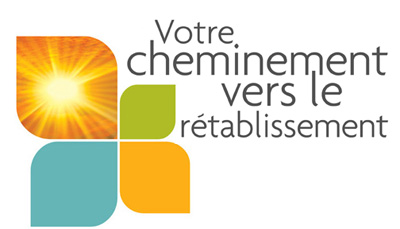
Ressources supplémentaires |
 |
|---|
Sites Web
Recovery Innovations. http://www.recoveryinnovations.org(en anglais).
Pennsylvania Recovery and Resiliency. http://www.mhrecovery.org(en anglais).
Mental Health Recovery. http://www.mhrecovery.com(en anglais).
Rethink. http://www.rethink.org/(en anglais).
Recovery Opportunity. http://www.recoveryopportunity.com/(en anglais).
Association canadienne pour la santé mentale. http://www.cmha.ca.
Vidéos
Voices of Resiliency. Manitoba Schizophrenia Society. Pour commander, consulter
www.mss.mb.ca.
Psychosis, Early Intervention and Recovery. British Columbia Schizophrenia Society,
Victoria Chapter. Pour commander, consulter www.bcssvictoria.ca.
Le Mental Illness Education Project offre plusieurs excellents vidéos sur le rétablissement. Pour commander, consulter http://www.miepvideos.org/shop/.
Livres
Recovery in Mental Illness par Ruth O. Ralph et Patrick W. Corrigan. Washington, D.C : American Psychological Association, 2005.
The Complete Family Guide to Schizophrenia par Kim T. Mueser et Susan Gingerich. Guilford, 2006.
Living Outside Mental Illness: Qualitative Studies of Recovery in Schizophrenia par Larry Davidson. New York, New York University, 2005.
Recovery from Severe Mental Illnesses: Research Evidence and Implications for Practicepublié par L. Davidson, C. Harding et L. Spaniol. Boston : Boston University. Vol. I, 2005; vol. II, 2006.
Articles et chapitres
« Scientific and Consumer Models of Recovery » par A. Bellack. Schizophrenia Bulletin, 32(3) 2006, p. 432–442.
« What happened to civil rights? » par L. Davidson. Psychiatric Rehabilitation Journal, 30(1), 2006, p. 11–14.
« Recovery in serious mental illness: A new wine or just a new bottle? » par L. Davidson, M. O’Connell, J. Tondora, M.R. Staeheli et A.C. Evans. Professional Psychology: Research and Practice, 36(5), 2005, p. 480–487.
« The top ten concerns about recovery encountered in mental health system transformation » par L. Davidson, M.J. O’Connell, J. Tondora, T. Styron et K. Kangas. Psychiatric Services, 57(5) 2006, p. 640–645.
« “Simply to be let in”: Inclusion as a basis for recovery from mental illness » par L. Davidson, D.A. Stayner, C. Nickou, T.H. Stryon, M. Rowe et M.J. Chinman. Psychiatric Rehabilitation Journal, 2006, 24: 375–388.
« Recovery guides: An emerging model of community-based care for adults with psychiatric disabilities » par L. Davidson, J. Tondora, M. Staeheli, M. O’Connell, J. Frey et M.J. Chinman. Dans : Community Based Clinical Practice, éd. A. Lightburn et P. Sessions (New York : Oxford University Press, 2005), p. 476–501.
« Implementing recovery oriented evidence based programs: identifying the critical dimensions » par M. Farkas, C. Gagne, W. Anthony et J. Chamberlin. Community Mental Health Journal, 41(2), 2006, p. 141–158.
« Integrating Evidence-Based Practices and the Recovery Model » par F.J. Frese, J. Stanley, K. Kress et S. Vogel-Scibilia. Psychiatric Services, 52, novembre 2001, p. 1462–1468.
« The Vermont longitudinal study of persons with severe mental illness, II: Long-term outcome of subjects who retrospectively met DSM-III criteria for schizophrenia » par C.M. Harding, G.W. Brooks, T. Ashikaga, J.S. Strauss et A. Breier. American Journal of Psychiatry, 144, 1987, p. 727–735.
« What is recovery? A conceptual model and explication » par N. Jacobson et D. Greenly. Psychiatric Services, 52, 2001, p. 482–485.
« The process of recovery from schizophrenia » par L. Spaniol, N.J. Wewiorski, C. Gagne et W.A. Anthony. International Review of Psychiatry, 14, 2002, p. 327–336.

